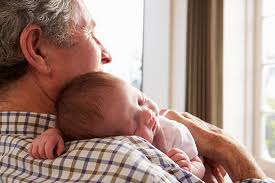Caring into Retirement by Frank Gaze
The other day I held our new granddaughter and rocked her to sleep on my arm.
When I was about 12 years old, my mother took on the care of her cousin’s baby for a few days, and taught me how to help her with that baby. I was able to learn how to give him his bottle and make sure he was comfortable while drinking it.
Many of us have our most active work as carers when we look after our children or our grandchildren.
My new granddaughter is a big baby: ten pounds or so. I put her on my arm, with her shoulder in the crook of my elbow, her tummy on my forearm and her other knee in the palm of my hand. I found many years ago that this position, with the weight taken on the arm and the face looking down towards the floor, is a comfortable one for little babies, and the rocking they get automatically as you move about sends them off to sleep before long. If they happen to bring up a bit of the feed, it falls on the floor and not on your clothes! And it leaves your other hand free to do some of the other jobs carers are responsible for.
****
More difficult is looking after someone older than oneself. When I was in my early seventies my mother-in-law lived with us; she was in her eighties and already starting on the Alzheimers trail. One morning she was depressed and insisted on staying in bed, in a foetal position, grumbling at anyone who came near her.
She was due for an appointment with the specialist at Elderly Health around 10, and my wife went off to work leaving Nana in my care. When she hadn’t got up by 9 30, I decided it was time for action. So I marched into Nana’s room and told her we were going to the doctor. She made it clear she didn’t want to go. So I got out her dressing-gown and slippers and said, “Here, put these on and I’ll help you out to the car!” Slowly, and unwillingly, Nana allowed me to put her dressing-gown around her and her slippers on her feet and then walked slowly to the car and was strapped in.
The specialist went through his normal process, quickly picked up the depression, and prescribed a relatively new drug. “It may take up to three weeks to work, but it’s worth trying.”
We picked up the pills from the chemist, went home, had lunch and Nana took her first pill. Then she had a nap and two hours later she was a different person: bright, cheerful, talkative, pleasant, and even interested in conversation over coffee and a shot at one of her favourite activities, the daily crossword.
****
The most difficult of caring tasks is supporting someone who is going through the prospect of a terminal illness.
My daughter had been diagnosed with a brain tumour six months or so before and one afternoon as I visited her in hospital she said: “Daddy, I am going to die, aren’t I?” The promised operation had not taken place, and in spite of radiotherapy there appeared to be no halting the steady decline in her health.
“Yes, Darling, I’m afraid you are. But Mum and I will stay with you all the time.”
What a heart-wrenching job to have to do; what courage of a girl to broach the subject with her Dad! What a great memory for a former carer to carry!
****
Ultimately, though, it is looking after oneself that is the most likely task we will all have.
My experience of the health services in these situations is that they are wonderful once they identify a life-threatening condition. Once they have saved your life though, they tend to relax and move on to the next situation. At this stage you are on your own to a large extent, and of course that is how it should be. A large part of getting better is taking responsibility for one’s own recovery.
So I have had to work out my own improvements to my diet, ensure I do my daily exercise, get the right amount of rest, and so on.
What is a bit of a problem is the variety of departments or specialties involved when you have multiple diagnoses. The card comes saying you have an appointment with a visiting specialist at Outpatients and you have no idea whether it is your oncologist or your urologist you are going to talk with.
The situation is improving with developments in technology; everyone involved can now get up to date by consulting your history online.
Best of all, health professionals are all learning to be friendly; many have always been positive and encouraging. Last time I left hospital the surgeon said, “Now go home and forget about doctors for a while!”
